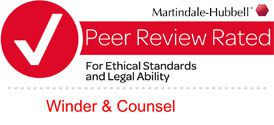Condemnation: Protecting the Rights of Property Owners During Eminent Domain Proceedings
Private property can be taken by the government for public use. If the day comes you are approached by the government to acquire all of your property, or a portion of it, there are several things about which you need to be aware. This seizure of your property for public use is known as eminent domain, and these proceedings must follow certain Constitutional rights.
If you are facing eminent domain proceedings, it is important that seek the advice of a Salt Lake City condemnation lawyer who is skilled in condemnation law. Keep reading to learn more about eminent domain and how Winder & Counsel can help you protect your rights.
Eminent Domain and Condemnation Proceedings: What Can Be Seized, and Why?
The Constitutions of Utah and the United States state that it is indeed possible. If the government needs private land for public use and offers the owner fair compensation for that property, the government may begin condemnation proceedings. The important thing to remember is that the property owner has the right of due process. This means that the property owner must be notified and given the opportunity to be heard.
There are several reasons why the government may need your property. Typically, it is for public use projects such as infrastructure projects, but commonly utility poles, communications towers, and pipelines may be behind the takeover as well. Many times, the government may only need a small portion of your land. In this case, you would need to be offered a fair amount for the piece of land, but also an additional amount to cover the lost value of your property as a whole (several damages). We have the leading published cases on severance damages in the State:, Utah Dep’t of Transp. v. Admiral Beverage Corp., 275 P.3d 208 (Utah 2012), Utah Dep’t of Transp. v. Ivers, 218 P.3d 583 (Utah 2009) and Ivers v. Utah Dep’t of Transp., 154 P.3d 802 (Utah 2007).
The government may also be interested in a temporary takeover of your property, such as using it to access another project. In this scenario, you would retain ownership of your property, but would be paid for the time your property is being used.
Condemnation Proceedings: What to Expect
While some condemnation proceedings are very simple—namely, the owner is willing to part with land—others can become lengthy, drawn-out processes. Here is what you should be able to expect from your condemnation process:
- The government reaches out to you to negotiate a just compensation for your property.
- Should you decline the offer, the government will file a court action to begin eminent domain proceedings.
- During your hearing, the government must prove that the property is being taken for public use and that it reached out to you in good faith with a fair value for your property.
- If the court rules in the government’s favor as to public purpose, it must determine the fair market value for your property and the government must pay you that amount.
Know Your Rights and Protect Yourself
During eminent domain proceedings, it is paramount that you know your rights in order to protect yourself and your property. There are several cases of the government abusing eminent domain for use other than public good. It is also common that the offers you receive may not be the fair market value to which you are entitled.
If you have been approached by the government in an attempt to negotiate the purchase of your land, seek an experienced Salt Lake City condemnation attorney immediately. At Winder & Counsel, our condemnation attorneys have represented many Utah residents during eminent domain proceedings, including the largest condemnation case in the state, Antelope Island, and helped ensure that rights under the Utah and U.S. Constitution were upheld. For more information, contact our office today at 801-322-2222.




